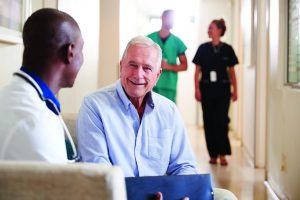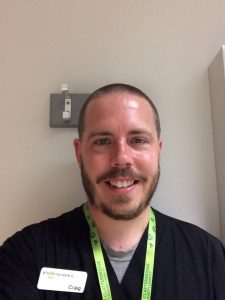Craig Simon, Haemato-Oncology Nurse Consultant at Clatterbridge Cancer Centre – Liverpool, talks us through his role and explains why having a nurse consultant in the team focuses clinical and nursing staff on patient-centred care.
Describe the role of a Haemato-Oncology Nurse Consultant
Whilst there is no national agreed standard, it is widely accepted that the role of a haemato-oncology nurse consultant should be 50% clinical and 50% managerial/operational. I enjoy the clinical aspects most. As the most senior clinical nurse in the department, I lead on delivering world-class, advanced haemato-oncology nursing care. I work within the four pillars of advanced practice: clinical, education, leadership/management and research. My clinical role is within the plasma cell field, delivering care from diagnosis to end-of-life. For education, I am responsible for mentoring staff (including students and postgraduates wanting to progress to clinical nurse specialist (CNS) or advanced nurse practitioner (ANP) roles), as well as providing education outside the department. There can be an anxiety over the complexity of haemato-oncology, so I provided education to solid tumour colleagues when the plasma cell team integrated into Clatterbridge Cancer Centre services. In terms of leadership, I line manage a team of 21 CNSs and ANPs across haemato-oncology. For research, I am involved in audits and also assess patients on clinical trials.
How does your nursing experience help you in your current role?
Experiencing all bands of nursing and completing an MSc in Advanced Practice has provided both an academic and clinical grounding to meet the demands of what a nurse consultant is expected to do. I hugely benefit from a wealth of experience I have gained across different nursing roles, including ward-based staff nursing, day unit nursing with some charge nurse experience, CNS, and ANP experience. This experience gives me a greater appreciation of the individual roles and everyday challenges facing the staff I manage, as I have been in the same position. It allows me to be a more effective leader.

How does the role benefit colleagues in the plasma cell disorders team?
Almost all of my clinical experience has been spent in the plasma cell field, from MGUS through to myeloma, plasmacytoma and AL amyloidosis, so bringing expertise to the team. I provide nurse-led clinics with CNS colleagues, but also join consultant-led clinics and work alongside clinical medical colleagues. My role bridges the gap between nursing and medicine, making the team more rounded and removing traditional boundaries. It makes it easier to involve all of the team in decision-making, so at diagnosis or when progressing through lines of therapy, it is no longer one person making decisions about a patient.
For this question, we also spoke to Craig’s colleagues, who told us the following:
Craig brings a unique perspective to the team and significantly enhances the myeloma service. His post has strengthened senior clinical leadership in the team and increased capacity for assessment and review of newly diagnosed patients.
Craig is an asset to the team, and his role links CNSs and consultants together to make best use of differing strengths and give a sense of equality between all team members in decisions around treatment.
Having a collective approach to each patient has broken down role barriers in the team and patients feel confident in seeing any member of staff, which has become increasingly important as the pandemic stretched capacity. Craig facilitates this approach with his nursing background and current clinical work, encouraging the consultants in a more holistic approach to patient care.

How does the role benefit patients?
My role encompasses what traditionally a specialist registrar may do but with the added benefit of nursing experience, meaning I can provide consistent continuity of care without having to rotate. This allows me to develop a therapeutic relationship with patients, starting from my involvement in diagnosis (including undertaking bone marrow biopsies and seeing patients in clinic referred on 2 week wait pathways), through to treatment (both prescribing and administering), and ultimately progression through various lines of therapy to end-of-life care, including having difficult conversations throughout this journey. The wider elements of my role also allow me to have influence and shape the development of the services we offer. Operationally, I have been involved in integration of haemato-oncology into the new hospital (as we were previously based in the old Royal Liverpool University Hospital), including the development of pathways for patients into the Clinical Decision Unit, hotline services and the expansion of home treatment for myeloma patients on daratumumab.
Has your role developed or changed at all since you have been in post?
Since starting in August 2021, the role has been constantly evolving and developing. The main development has been my involvement in recruitment processes, which we’ve done a lot of to strengthen our CNS and ANP teams. As I have settled into the role, I have taken on the mentorship of some of our ward-based nurses who are undertaking a relatively new qualification: MSc Apprenticeship. This is a new way of doing the MSc that is much more clinical with 80% training done on-the-job. Acting as their key mentor means I am hopefully shaping the future of our CNS and ANP workforce within both The Clatterbridge Cancer Centre NHS Foundation Trust and across the North West of England. I’ve also become practice assessor for a number of nurses completing a non-medical prescribing qualification. Again, futureproofing the nursing workforce is key, as I want nurses who are in the best position to step into CNS roles when those above them retire or move on. Finally, as we progress with our trial portfolio within the myeloma service, I am included on delegation logs, meaning I can see, assess and treat patients on clinical trials. I have plans to progress the role further in the future, and hope to look at doing a doctoral study with possible PhD.
What advice would you give to new or would-be nurse consultants?
Allow yourself time to settle into the role. When taking on more advanced roles in nursing there is always the danger of putting too much pressure on yourself right away; don’t try to do too much too quickly. The nurse consultant role is all encompassing and covers a wide breadth of both nursing and traditionally what medics would do, so there can be some role conflict. Be clear from the outset what you want your role to look like, and trust in yourself that you have the independence and autonomy to achieve this. I’ve found shaping my role within the four pillars of advanced practice has really helped guide me with this, and provided specific focus since I started. I’m also very fortunate to work within an excellent team with fantastic colleagues. Remember you are only as good as those around you. This is why I am so keen on mentorship and leadership: if you strengthen the people around you, you strengthen your role.
Q&A with Craig Simon
Haemato-Oncology Nurse Consultant
Clatterbridge Cancer Centre – Liverpool







